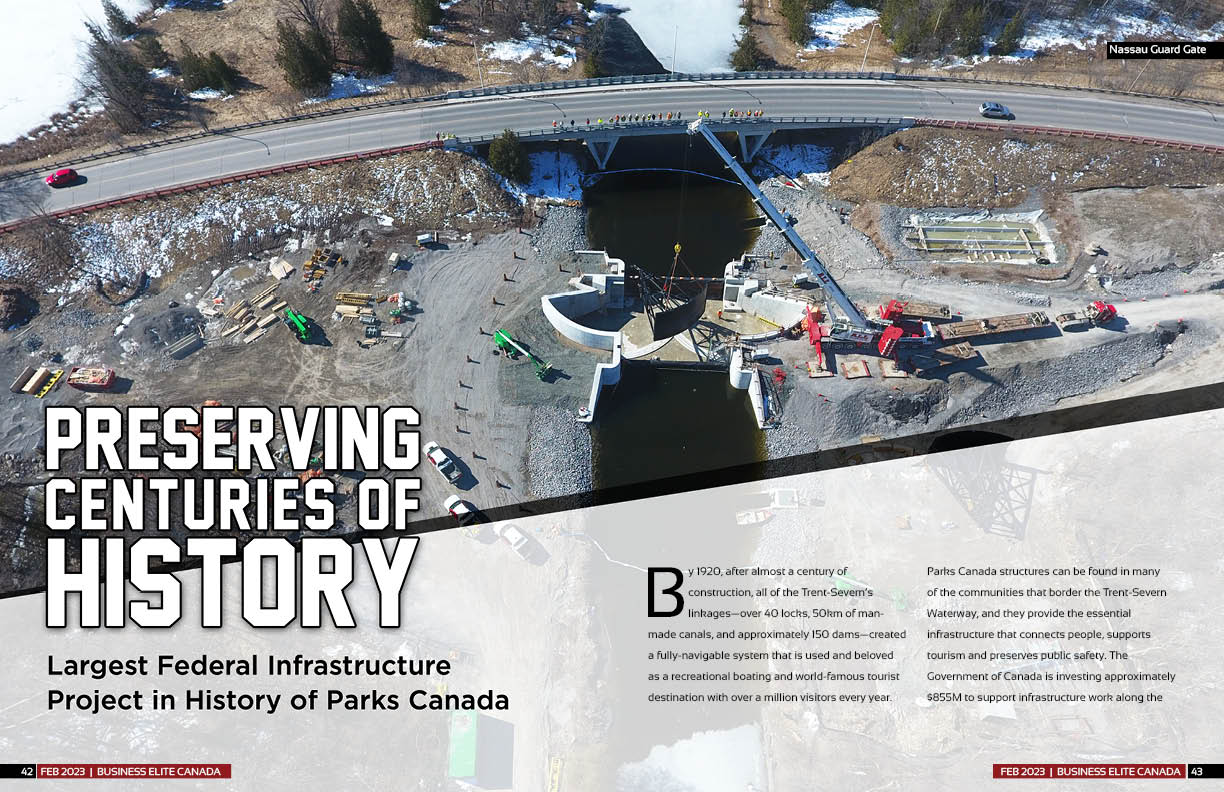By 1920, after almost a century of construction, all of the Trent-Severn’s linkages—over 40 locks, 50km of man-made canals, and approximately 150 dams—created a fully-navigable system that is used and beloved as a recreational boating and world-famous tourist destination with over a million visitors every year.
Parks Canada structures can be found in many of the communities that border the Trent-Severn Waterway, and they provide the essential infrastructure that connects people, supports tourism and preserves public safety. The Government of Canada is investing approximately $855M to support infrastructure work along the Trent-Severn Waterway National Historic Site as part of the largest federal infrastructure plan in the history of Parks Canada. Funding was first received as part of Budget 2014, and as of April 2022, approximately $786M has been spent, with project work ongoing.
Through infrastructure investments, Parks Canada is protecting and conserving national treasures while supporting local economies and contributing to growth in the tourism sector and has delivered approximately 70 projects to date.
“It’s a rare opportunity to get inside the minds of the original builders and better inform our efforts to maintain the historical character of each place,” says David Britton, Director of Ontario Waterways.
“What makes these projects so unique is how the past interacts with our present, even our future. The start of any rehabilitation project can, in many ways, feel like cracking open a time capsule.”
Investments in heritage, visitor, waterway and highway infrastructure ensure safe, high-quality and meaningful experiences for visitors, enabling Canadians to discover nature and connect with history, says Britton. “Infrastructure projects in National Historic Sites are guided by our Cultural Resource Management Policy, Standards and Guidelines for the Conservation of Historic Places, Historic Canals Regulations and Parks Canada’s mandate to preserve and protect Canada’s natural and cultural heritage.”
Investments in the preservation and restoration of national historic sites will protect these important heritage places for future generations. “Maximum integrity possible” is the dictating principle on a project such as this. “Cultural resources of national significance are replaced in situ,” says Britton. “We do this by examining the character-defining elements of the place and then incorporating as many as possible into the design of new assets to maintain the continuity of the landscape and historical feel. When it comes to historic assets, we rely heavily on the original design drawings and contract documents from our archives to guide our design choices.”
Minimal Disruption
Nearly 1.5 million people visit or use the Waterway a year, making working around the public a major consideration in the planning phase of these projects. “Parks Canada makes every effort to minimize disruption caused by infrastructure projects for residents, the boating public as well as land-based visitors that enjoy the Trent-Severn Waterway,” Britton says. During the navigation season, projects involving dams and swing bridges adjacent to the navigation channel cannot impact the safe passage of vessels. Still, the more significant issue can be completing work outside of the navigation season to ensure that boats can be back on the water when the navigation season opens again. Lock projects, for example, must happen outside of navigation season. This brings with it the complications of construction under winter conditions—for example, requiring the temporary enclosure and heating of areas to protect the construction works.”
Operational and Natural Factors
Because the work is done alongside the public, safety has to be and is a top priority for Parks Canada. The Agency has a requirement to manage water levels and flows across the waterway system at all times to account for potential floods, droughts and to maintain navigation. This requires that dam and bridge construction be completed in phases, or a specifically designed bypasses must be put in place during construction to ensure we can meet our water management responsibilities.
“If we block any of these flows between February and May, adjacent properties may be impacted. Parks Canada project teams take this risk very seriously and plan our projects accordingly,” says Britton. Other environmental factors such as fish spawning windows, turtle nesting times, species at risk requirements are also considered, as are limits to the timing of tree removal related to migratory bird nesting.
Partners and Stakeholders
Parks Canada continues to engage with First Nations communities on the work program, mainly in archaeological studies and environmental monitoring. Stakeholder groups have sometimes been involved in some aspects of the work, as in the case of turtle nest protection at Thompson’s Bay Dam. Coordination with municipalities has been essential to minimize overlapping impacts from their own projects. At times, agreements for a land lease for access and staging have been needed with the provincial government, municipal authorities and private land owners. Fisheries and Oceans Canada and Transport Canada have authorized large dam projects. Public Services and Procurement Canada have assisted with some of the contract tender processes and, at times, overall project management.
According to Britton, big projects require big solutions. Where the original builders might have used hand tools, today, builders use heavy machinery. A dam in what was once the middle of remote wilderness or farmers’ field now sits at the centre of a thriving community. “There are modern challenges that come with closures to certain areas and disruptions in traffic,” says Britton. “There can be a lot of noise and vibration centred around a project. All of this can cause concerns among residents and business owners. Parks Canada has made efforts throughout the program of work to ensure pre-project, proactive engagement has occurred, and then ongoing updates on projects have been communicated to the public and stakeholders, along with efforts in planning and executing projects to minimize the impacts as much as possible.”
The past, present and future
This program of work has been the largest federal investment of funding into the Trent-Severn Waterway National Historic Site since it was created. With each new project, Canadians learn even more about the ambitious engineering and skilled labour that went into the Waterway’s original construction. We also learn more about how much communities depend on a safe and functional Waterway and the real impacts each project has on the continued health of our ecosystems and economies. “Along the way,” says Britton, “We have discovered new ways to engage stakeholders in the shared interest of a sustainable Waterway, and we have created new opportunities for collaboration with the next generation. With this historic investment in infrastructure, Parks Canada has worked hard to preserve the National Historic Site and ensure that the many people that live, work, and play here can enjoy it safely for generations to come.”
For more information, please visit https://parks.canada.ca/lhn-nhs/on/trentsevern






